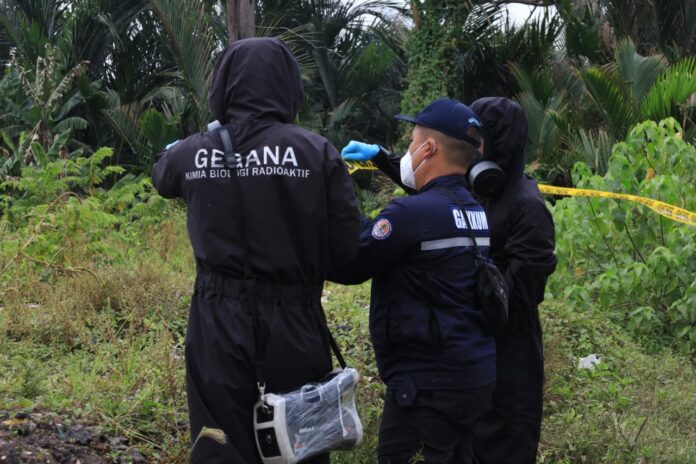Ecobiz.asia – Indonesia’s Ministry of Environment and Environmental Control Agency (KLH/BPLH) has mapped radioactive contamination of cesium-137 (Cs-137) in the Cikande industrial area, Serang Regency, Banten, and has begun decontamination at several affected sites.
Environment Minister Hanif Faisol Nurofiq, who also chairs the National Task Force for Cs-137 Radiation Response, led on-site inspections together with senior officials including Rasio Ridho Sani, Deputy for Pollution and Environmental Damage Control, and Rizal Irawan, Deputy for Environmental Law Enforcement.
“The handling of Cs-137 contamination is being carried out in a coordinated and scientific manner through radiation mapping, soil and water sampling, site isolation, and the installation of radiation hazard signs,” Hanif said on Monday (Oct 6, 2025). He added that a temporary storage facility for radioactive waste is also being prepared in line with safety standards.
The government has classified the incident as a special environmental emergency, mobilizing multi-agency resources to ensure the safety of local communities and prevent further contamination. A task force team led by Rasio Ridho Sani has conducted decontamination at four industrial facilities found to have radiation levels above background readings.
A joint survey by the National Research and Innovation Agency (BRIN), the Nuclear Energy Regulatory Agency (Bapeten), and the Indonesian Police’s Nuclear, Biological, and Chemical Unit (KBRN) is ongoing within a 2–5 km radius of the contamination site. At one location, radiation levels exceeded 500 µSv/hour, prompting the installation of warning signs and tighter access control.
The Environment Minister also inspected a vehicle monitoring post operated by the Police’s Gegana bomb squad to detect possible radiation spread outside the industrial zone. He later met residents of Nambo Udik village to raise awareness of radioactive hazards.
Following recommendations from BRIN and Bapeten, the Health Ministry will conduct medical checks for residents in nearby areas and roll out public education campaigns on clean and healthy living practices (PHBS) with support from the military, police, and community leaders.
“The government’s priority is to ensure that the Cikande industrial area is safe, clean, and free from radioactive exposure,” Hanif said. ***





